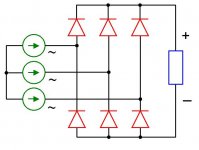it is uncommon for a household to have a 3phase service, but it can be done with added expense....
industrial users otoh are almost always 3phase....
industrial users otoh are almost always 3phase....
Member
Joined 2009
Paid Member
In Canada 3 phase is standard. This is because we only have 120V nominal between phases and if you have an electric oven or clothes dryer you need the extra phases to get 240V. In my fuse box they wired it up so that there's a kind of balance between the phases so theoretically there are 120V electrical outlets on different circuit in my house that are actually 240V apart (as they'd be on different phases).
The 3 phase rectifier does not have 3 times 4 diodes, I think it has just 6 diodes but I don't know how they are wired up.
here's one example. 🙂
Attachments
no extra expense.it is uncommon for a household to have a 3phase service, but it can be done with added expense............
The rate per kWh is the same.
The rate per day is the same.
The meter is more bulky and sufficient room has to be kept on the distribution back board for it.
There are no extra costs, in the UK, for a domestic 3phase supply.
The electricity suppliers do not even ask what kind of meter I have, nor do they ask what kind of supply that I have. The only question they usually ask, "do you have off peak or white meter?" Yes in my first house, the off peak was on a different phase from the on peak. No in my next two houses.
I know, I have had it in all three of my houses over the past 31years.
Last edited:
Canada is similar/same as the USA for electric supply.In Canada 3 phase is standard. This is because we only have 120V nominal between phases and if you have an electric oven or clothes dryer you need the extra phases to get 240V. In my fuse box they wired it up so that there's a kind of balance between the phases so theoretically there are 120V electrical outlets on different circuit in my house that are actually 240V apart (as they'd be on different phases).
Houses get a split phase supply.
They get a 230Vac with centre tap. That allows both 115Vac and 230Vac for appropriate appliances.
Your local carrier (who owns the cables in the street) may charge your supplier (who sends your bill) a slightly higher daily charge for the 3-phase connection, but many suppliers may choose to absorb that cost rather than pass it on to their customers.AndrewT said:There are no extra costs, in the UK, for a domestic 3phase supply.
If you routinely ask for a 3-phase supply then that is unusual. Most UK houses have single phase.
Why not ask Mr. Jung himself to post a proper copy of the article ?
A New “By Request” Page WaltsBlog
Patrick
A New “By Request” Page WaltsBlog
Patrick
i will be more interested in his comments though.....after 30 years.......i have the magazine article scanned in case any one wants it, just fire me an email and i will send it to you...
Off Topic issue.
There is no extra charge.
Go and ask, you should find exactly the same.
If you don't have a 3phase cable into your house, then you will have to pay to get that cable laid in.
Once that cable is there, the meter change to 3phase is done for free.
The carrier and the supplier were the same company until a few years ago. Yes for the first 25 years or so the same company that installed the cable and the meter also supplied the electricity.Your local carrier (who owns the cables in the street) may charge your supplier (who sends your bill) a slightly higher daily charge for the 3-phase connection, but many suppliers may choose to absorb that cost rather than pass it on to their customers.
If you routinely ask for a 3-phase supply then that is unusual. Most UK houses have single phase.
There is no extra charge.
Go and ask, you should find exactly the same.
If you don't have a 3phase cable into your house, then you will have to pay to get that cable laid in.
Once that cable is there, the meter change to 3phase is done for free.
In Scotland the generator would have been the same company too. The structure was different in England and Wales even before privatisation.
Sweden has every household on 400/230 3-phase power (possibly except old apartments). Cooking ranges, sauna heaters and water boilers are the principal usage areas for actual domestic 3-phase appliances. Beyond that it's mainly a matter of balancing the load for the distribution network.
I wouldn't say the meters are particularly bulky.
I wouldn't say the meters are particularly bulky.
- Status
- Not open for further replies.
- Home
- Amplifiers
- Solid State
- Walter G. Jung's Energy Storage Bank
